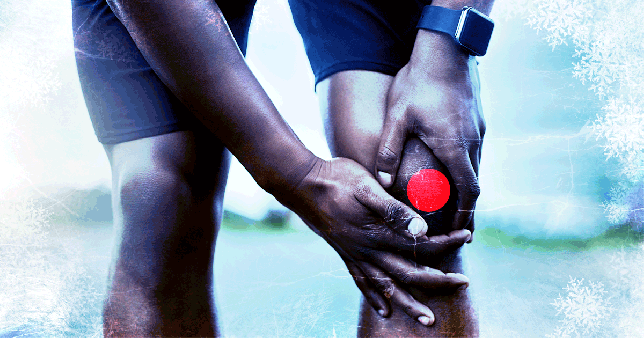
Few things make us feel older than saying this, but here we go: do you find that your knee pain gets loads worse when the weather’s cold?
You might notice a real stiffness when you pop out for a chilly morning run, or feel your knees groaning when you get up from the sofa.
If you’re nodding along to this, you’re not alone. Knee aches in the winter are very much a thing – but why?
Paul Lee, sports and orthopaedic surgeon at MSK Doctors, tells Metro.co.uk that experts like him believe this is down to blood being diverted away from muscles and joints in an effort to keep the body warm when it’s bloody freezing.
‘Fluid within the knees can thicken so that it is not able to flow as freely and absorb impact as it normally would,’ explains Paul.
‘Simultaneously, low air pressure triggers the same fluid and gasses to expand, placing pressure on the nerves while bone and cartilage expand and contract.
‘Those who suffer with knee problems throughout the year may experience greater discomfort in winter as nerves become more sensitive to the cold and inflammation occurs.’
So that’s why it happens. Now what can we do about it?

Firstly, make sure you don’t react to cold weather knee pain by ditching the exercise entirely and just lounging on the sofa instead, no matter how tempting it may be.
You might want to switch up your usual outdoor workouts for warmer pursuits, however.
‘Despite the weather, it is important that we continue to exercise our joints to maintain circulation,’ says Paul.
‘One of the best ways of doing this is through indoor swimming. The warm water keeps your joints buoyant and supported so there is little weight- bearing pressure.
‘Increased blood flow lubricates the joints reducing pain and inflammation, allowing for a greater range of motion.’
Make sure that if you are going on a run on a brisk day, wrap up warm to keep your blood flow healthy. You can even get special knee wraps to keep this area nice and cosy.
Then, there are other things you can do to prevent knee pain more generally, whatever the weather.
Make sure you stay hydrated – dehydration reduces your flexibility and increases wear and tear, which can lead to knee injury… meaning more pain.
Strengthen your legs to protect the knees, doing exercises that strenghthen your thighs and calves.
Ensure that you’re running with good form. If you’re not sure, it’s worth chatting with a personal trainer who specialises in running or going to a specialist running shop for a proper gait analysis.
Make sure that you warm up and stretch. Don’t skip these essential steps – they really are important. Before you start any workout, break a sweat and stretch out muscles to prevent injury.
Ensure your diet is healthy to reduce inflammation.
Talk to a doctor if your knee pain is overwhelming. They’ll be able to check what’s going on and recommend the right treatment.
Do you have a story to share?
Get in touch by emailing [email protected].
Source: Read Full Article